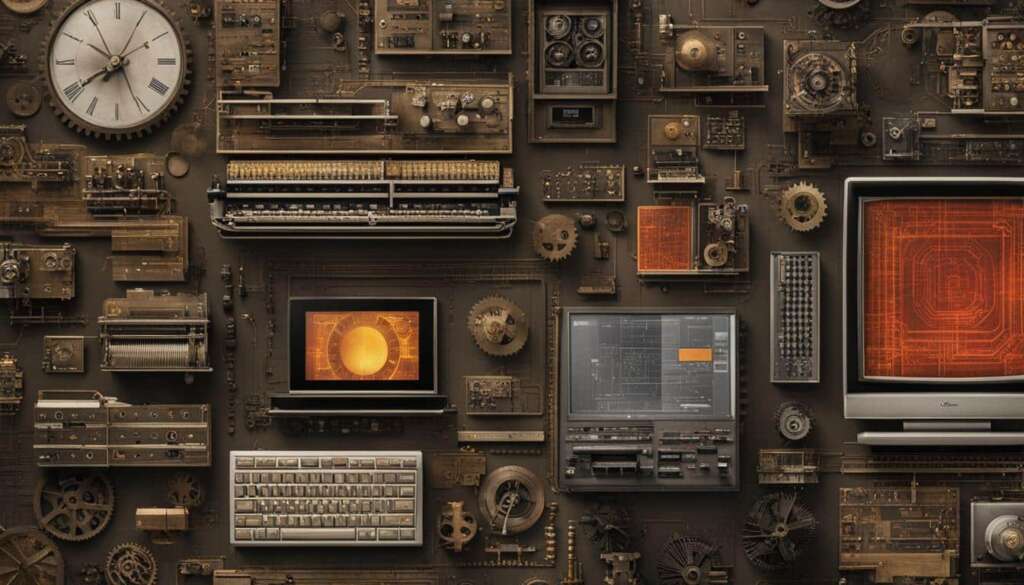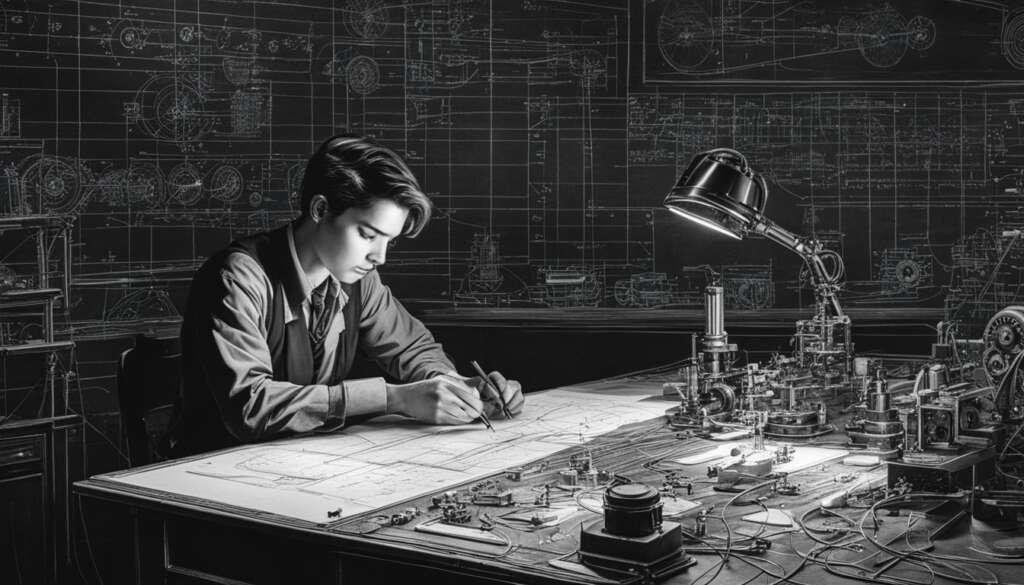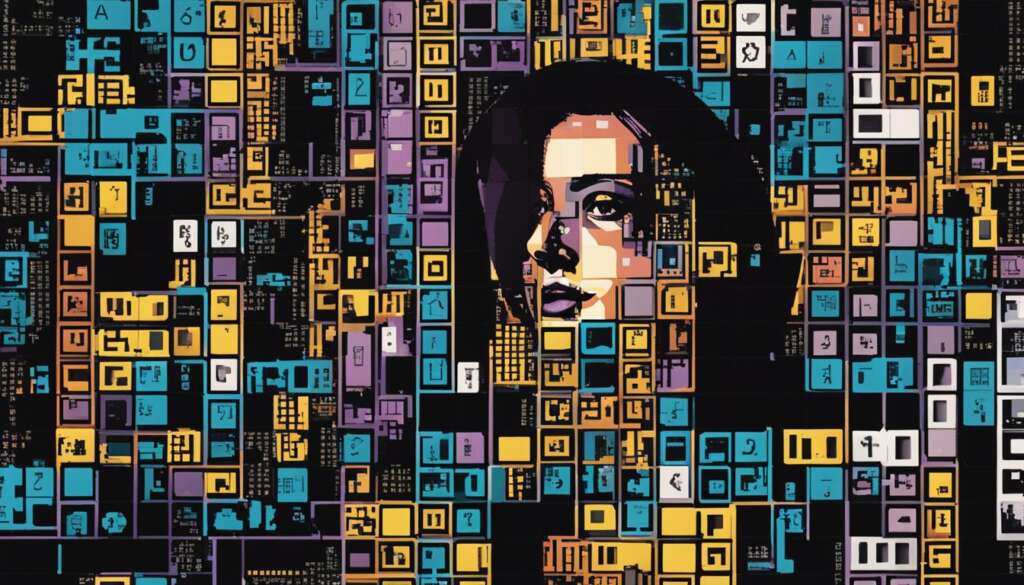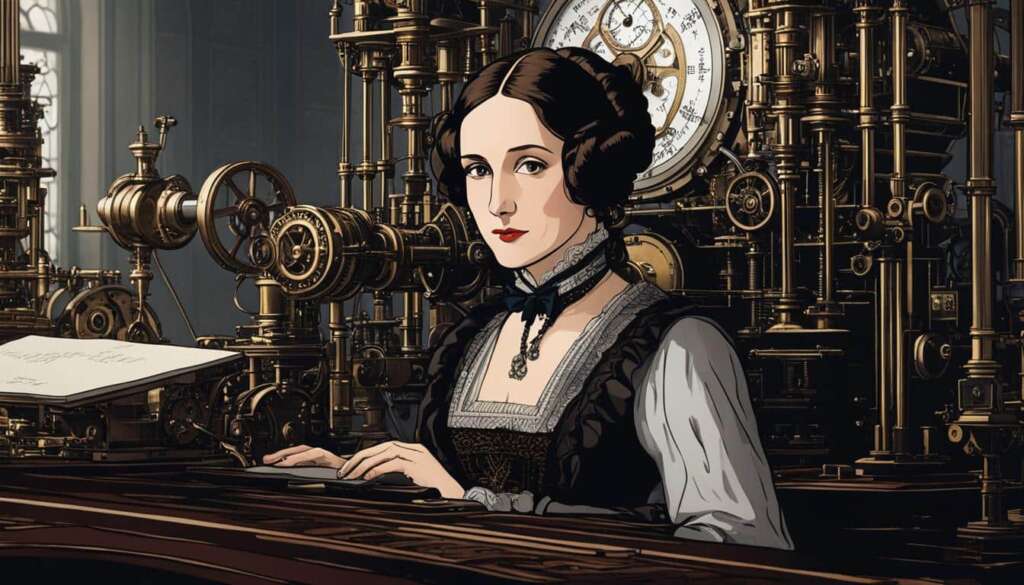Table of Contents
When was the first computer invented? Delving into computer history can shed light on the technological advancements that have shaped our world. From early computing devices to the modern-day marvels we carry in our pockets, computers have come a long way.
In the mid-20th century, the first computer as we know it today emerged. However, the roots of computer history can be traced back to the early 19th century. Charles Babbage, an English mathematician, is hailed as the “father of computing” for his groundbreaking work on the Analytical Engine.
It was in the late 1930s that the Atanasoff-Berry Computer (ABC) paved the way for modern computers. Invented by John Atanasoff and Clifford Berry, this electronic marvel utilized binary digits and electronic switches for calculations, setting the stage for future advancements.
Stay tuned as we unravel the fascinating evolution of early computers, the rise of personal computers, and the modern computing revolution. Join us as we explore the journey of computing devices through the ages.
The Evolution of Early Computers
During the mid-20th century, the development of computers progressed at a remarkable pace. This period witnessed the emergence of computer pioneers who laid the foundation for the modern computing devices we rely on today. These pioneers, driven by their groundbreaking ideas and relentless pursuit of computer innovation, pushed the boundaries of technology and revolutionized the world of computing.
One of the significant milestones in the evolution of early computers was the creation of the Electronic Numerical Integrator and Computer (ENIAC) in 1946. Developed by John W. Mauchly and J. Presper Eckert, this massive machine weighed over 30 tons and marked a significant advancement in computer development. The ENIAC was the first general-purpose electronic computer, capable of performing complex calculations with unprecedented speed. It played a crucial role in scientific research, military computations, and paved the way for future advancements in computing technology.
“The world is changing, and it will continue to change. But the computer will always remain at the forefront, shaping our future.” – Grace Hopper
Another noteworthy contribution to early computer development came from Alan Turing, a British mathematician and computer scientist. Turing’s theoretical work on computation and the concept of a universal machine laid the groundwork for the development of the modern computer. His vision and understanding of computation inspired generations of computer scientists and established the theoretical underpinnings that led to significant advancements in computer technology.
| Pioneer | Contribution |
|---|---|
| Alan Turing | Theoretical foundations of modern computing |
| Grace Hopper | Coined the term “bug” and pioneered the development of programming languages |
| John von Neumann | Contributed to the architecture of modern computers |
These early pioneers, along with others like Grace Hopper and John von Neumann, paved the way for the rapid evolution of computers. Their groundbreaking work allowed for the development of more powerful and efficient machines, which ultimately led to the creation of the computerized world we live in today.
The evolution of early computers is a testament to human ingenuity and the desire to push the boundaries of what is possible. These pioneers laid the foundation for the technological advancements that continue to shape our lives. As we reflect on the journey of computer development, it is clear that their contributions have transformed the way we live, work, and interact with the world around us.
Personal Computers Enter the Scene
The timeline of early personal computers marks a significant shift in computing history, as it brought the power of computation into the hands of individuals. The introduction of personal computers revolutionized the way we work and paved the way for the digital age we live in today. Let’s take a closer look at the key milestones in the development of early personal computers.
1975: The Altair 8800
One of the earliest personal computers to enter the scene was the Altair 8800, introduced in 1975 by MITS (Micro Instrumentation and Telemetry Systems). It was a build-it-yourself kit that ignited the passion of computer enthusiasts and hobbyists. The Altair 8800 featured an Intel 8080 microprocessor and a toggle switch panel for input.
While the Altair 8800 was not user-friendly by today’s standards, it laid the foundation for the personal computer revolution by making computing more accessible to individuals outside of academia and research institutions.
1977: The Apple II and Commodore PET
In 1977, the introduction of the Apple II by Apple Inc. marked a turning point in the history of personal computers. It was a complete system with a built-in keyboard, color graphics, and a user-friendly interface. The Apple II became a commercial success and set the stage for the home computing revolution.
Around the same time, the Commodore PET (Personal Electronic Transactor) also made its mark in the personal computer market. The Commodore PET featured an integrated keyboard and monitor, providing a ready-to-use computing experience. It bridged the gap between hobbyist kits and consumer-friendly computers.
With the introduction of the Altair 8800, Apple II, and Commodore PET, personal computers started to gain traction in homes and offices, laying the groundwork for the evolution of computing technology.
Table: Milestones in the Development of Personal Computers
| Year | Personal Computer | Key Features |
|---|---|---|
| 1975 | Altair 8800 | Build-it-yourself kit featuring an Intel 8080 microprocessor |
| 1977 | Apple II | Built-in keyboard, color graphics, and user-friendly interface |
| 1977 | Commodore PET | Integrated keyboard and monitor for a ready-to-use computing experience |
These early personal computers were the pioneers that shaped the future of computing. They set the stage for further advancements in technology, leading to the powerful and sophisticated personal computers we use today.
The Rise of Modern Computing
In the early 1980s, the computer industry experienced a revolution that would shape the future of computing. The introduction of the IBM PC marked a turning point, bringing computers out of the realm of hobbyists and into the mainstream. This innovative personal computer featured an open architecture, making it compatible with industry-standard software. It soon became the preferred choice for businesses and individuals alike, propelling the PC market to new heights.
The rise of modern computing was not solely driven by IBM, however. Other players emerged during this time, leaving a lasting impact on the industry. Apple, with its introduction of the Apple II in 1977, revolutionized the way people interacted with computers. The Apple II featured a user-friendly interface, a built-in keyboard, and the ability to display color graphics. It played a significant role in popularizing personal computers and setting the stage for a computer revolution.
Microsoft also made its mark in the 1980s with the release of MS-DOS, its operating system for IBM-compatible PCs. MS-DOS provided a standardized platform for software developers and paved the way for the Windows operating system, which would become the dominant force in the computer industry for decades to come.
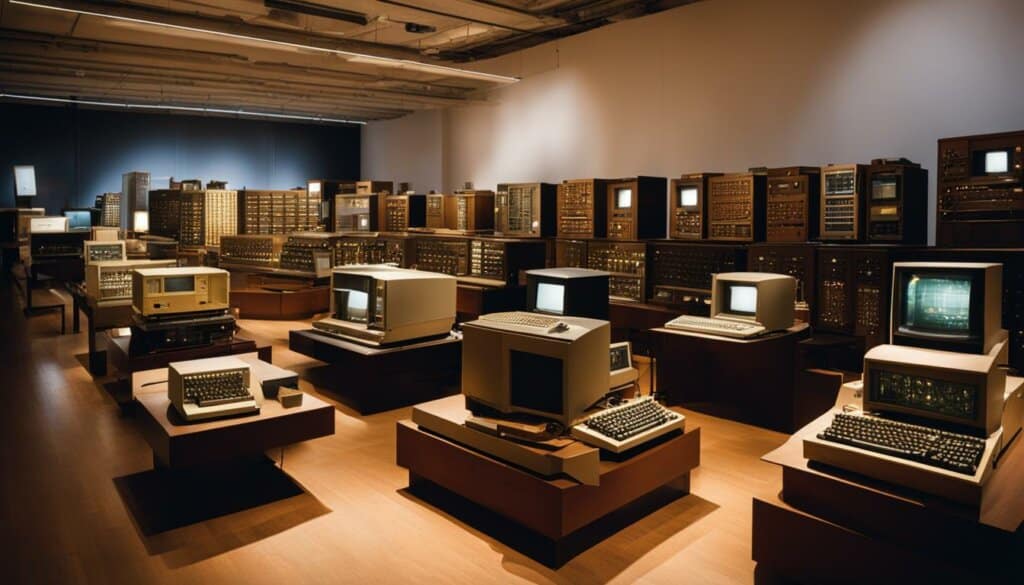
The Impact of Technological Advancements and Computer Innovation
“The rise of modern computing brought about a revolution in technology and innovation. It transformed the way we work, communicate, and live our lives. With the introduction of the IBM PC, personal computers became accessible to a wider audience, fueling the growth of the computer market. The user-friendly interfaces and standardized platforms offered by companies like Apple and Microsoft made computers more intuitive and versatile.”
Technological advancements continued at a rapid pace, leading to smaller and more powerful computers. The development of microprocessors and the proliferation of software applications opened up new opportunities for businesses and individuals. The rise of the internet further accelerated the growth of modern computing, connecting people across the globe and ushering in the digital age.
| Technological Advancements | Computer Innovations |
|---|---|
| Development of microprocessors | Apple II: User-friendly interface and color graphics |
| Proliferation of software applications | IBM PC: Open architecture and compatibility |
| Expansion of internet connectivity | MS-DOS: Standardized platform for software developers |
The rise of modern computing has transformed our world in ways unimaginable decades ago. Today, we rely on computers for almost every aspect of our lives, from communication and entertainment to business and research. The computer revolution, driven by technological advancements and computer innovation, continues to push the boundaries of what is possible and shape the future of our digital world.
Conclusion
The invention and evolution of computers have had a profound impact on society. From the early mechanical calculators to the modern-day smartphones, computers have transformed the way we work, communicate, and live our lives.
The history of computer development is a testament to human ingenuity and the desire to push the boundaries of technology. Throughout the years, we have witnessed remarkable technological advancements that have propelled computing devices to new heights.
As we continue to embrace the digital age, it is essential to understand and appreciate the rich computer history that has led us to where we are today. The pioneers of computing and their groundbreaking innovations have paved the way for the complex systems we rely on daily.
Looking ahead
With the rapid pace of technological advancements, the future of computing holds endless possibilities. From artificial intelligence and quantum computing to virtual reality and internet of things, computing devices will continue to shape our world in ways we can’t even imagine.
As we move forward, it’s crucial to stay informed about the ongoing developments in computer technology. By doing so, we can fully grasp the potential impact these advancements may have on our lives and society as a whole.
FAQ
When was the first computer invented?
The first computer was invented in the mid-20th century, but the history of computing can be traced back to the early 19th century.
Who is often referred to as the “father of computing”?
Charles Babbage, an English mathematician, is often referred to as the “father of computing” for his work on the Analytical Engine.
What was the first computer as we know it today?
The first computer as we know it today was the Atanasoff-Berry Computer (ABC) developed by John Atanasoff and Clifford Berry in the late 1930s.
What was the Electronic Numerical Integrator and Computer (ENIAC)?
The ENIAC was the first general-purpose electronic computer developed in 1946. It was capable of performing complex calculations and played a crucial role in scientific and military research.
When was the first personal computer introduced?
The first personal computer, the Altair 8800, was introduced in 1975 by MITS.
What computer sparked the home computing revolution?
The Apple II, introduced in 1977, brought personal computers into the mainstream with its user-friendly interface and built-in keyboard.
What other computer made its mark during this time?
The Commodore PET also made its mark with its integrated keyboard and monitor, bridging the gap between hobbyist kits and consumer-friendly computers.
What computer revolutionized the industry in the early 1980s?
The IBM PC revolutionized the computer industry in the early 1980s with its open architecture and compatibility with industry-standard software.

